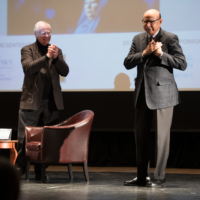Bill’s Blog


 It started in a bookstore . . .
It started in a bookstore . . .
The first Human Rights movement started in a bookstore, and it became the model for every civil rights effort to follow. On May 22, 1787, twelve people gathered in London to begin a process that would lead to the end of the British slave trade. It was the first time that any group had ever been formed to protect the rights of other people — not just the rights of themselves. if you’re a bookseller, it’s an inspiring heritage to live up to.
And that first meeting took place in a bookstore.
Bookstores have a long tradition of independent thinking, and they have often served as gathering places for their communities. Bookstores have always nurtured new, innovative, and often unpopular ideas.
NFK Luncheon
“No one wants to hear the author’s voice”
Bill’s Blog – Nov. 3, 2018
Speech to the National Kidney Foundation Author’s Luncheon
“The thing about writing a novel is this: no one really wants to hear an author talk about it. And there’s really more to it than that. When they finally read the book, readers don’t want to hear the author’s voice at all. When readers get into a story, it’s because they are experiencing it through the eyes of the characters. Authors may create the plot and the setting, but it is the characters who have to live in that world – maybe shaping it as they go along, or being shaped by it. But one way or another, it is the characters’ story. And if an author is lucky, the characters will imbed themselves into the heads of readers who will then do what every author hopes – flip the pages to find out what happens next.”
Hold the Presses!

Hold the Presses
Bill’s Blog – Dec. 1, 2017
When a book becomes a major news story, local news services often run to local bookstores to see what the story feels like on the ground. That was the case with Michael Wolff’s book Fire and Fury when the news hit the fan in January. That’s when this photo began its world-wide journey from Book Passage.
Who Needs Publishers & Bookstores? Just about Everyone

An idea has taken root in certain quarters that publishers aren’t necessary. And for that matter, who needs bookstores? According to this facile argument, they’re both are just relics of the pre-internet days. This is a very misguided idea.
Relentlessly Optimistic

I had the pleasure of sharing a stage with Khizr Khan at Dominican University for his book An American Family: A Memoir of Hope and Sacrifice. Khan is probably the most sincerely optimistic person I have ever met, and his enthusiasm is contagious. (If I knew the Pakistani word for mensch, I would insert it here.)
Seven Questions Writers Should Ask Before Publishing
Years ago, the only way to get published was to type the manuscript, send it to a publisher, and hope for the best. But book publishing has changed significantly. There are more opportunities — and many more pitfalls. Here are seven basic questions that authors should ask themselves.
This is a reprint of an article that I wrote for Huffingtonpost.com on March 4, 2014
The First Civil Rights Movement Began — in a Bookstore

It started in a bookstore . . .
It was the first Human Rights movement, and it became the model for every civil rights effort to follow. On May 22, 1787, twelve people gathered in London to begin a process that would lead to the end of the British slave trade. It was the first time that any group had ever been formed to protect the rights of other people — not just the rights of themselves. Those Londoners at that meeting were working to stop the slave trade and to stand up for the rights of those who were being forced into slavery off the coast of Africa.
And that first meeting took place in a bookstore.
Bookstores have a long tradition of independent thinking, and they have often served as gathering places for their communities. Bookstores have always nurtured new, innovative, and often unpopular ideas.
Who Needs Publishers & Bookstores? Just about Everyone
An idea has taken root in certain quarters that publishers aren’t really necessary any more. And for that matter, who…
